- Home
- David Downing
Stattin Station jr-3 Page 7
Stattin Station jr-3 Read online
Page 7
'How are you doing?' Russell asked unnecessarily.
'Not well,' Welland said shortly.
'I can see that. Look, I was upstairs, and they asked if I wanted to see you, so of course I said yes. The Gestapo have refused to give out any information since they arrested you. The Consulate's been trying to kick up a fuss, but they couldn't even find out where you were being held. Have you been here the whole time?
'Yes, I must have been.' He massaged his forehead with his fingers. 'They take me up every day for questioning. Sometimes twice a day. Hours and hours of it.'
'What do they think you know?'
Welland's laugh was utterly devoid of humour. 'They don't think I know anything. The interrogations, the beatings - they don't have any purpose. They're just for fun.'
Russell knew why he'd been offered this meeting , but what did it mean for Welland? They would assume that Russell would report the prisoner's condition to the Consulate, that there would be more and bigger protests. Was war between the two countries so close that they no longer cared? 'I'll let the Consulate know where you are,' he said. 'Are there any personal messages you want to send?' he asked.
'My father, back in the States.'
Russell took it his notebook. 'What's his address? What shall I tell him?'
'That I'm alive. That I love him.'
'And the address?'
Welland told him, stretching out the words in such a way that Brooklyn sounded like another planet.
After writing it all down, Russell looked up to find tears streaming down the young man's cheeks. 'They'll let you go soon,' he offered. 'They've made their point.'
'You think so?' Welland retorted bitterly.
Russell had rarely felt so helpless. He reached across and put a hand on the young man's shoulder. 'We'll get you out of here,' he promised, but the hollowness of his words was reflected in the other's despairing expression.
'You'd better be quick,' Welland replied. He was still crying, and once the cell door had closed behind him Russell heard the young American begin to sob. The sound stayed with him as he walked up the stairs, and it was a struggle to keep his anger under control.
Giminich was no longer there - his point made, he had left Leitmaritz to close out the demonstration.
'You may tell the American Consulate that espionage charges are being prepared against Herr Welland,' the Hauptsturmfuhrer said. 'It does not pay to abuse the hospitality of the Reich,' he added with a pointed stare at Russell. 'Now you may go.'
On his way back down to the main entrance, Russell tried to make sense of what had just happened. The visit to Welland had obviously been arranged to scare him, but to what end? Had all the stuff about Zembski and his communist past only been used to put him off guard, make him nervous? It was much more likely, he realised, that the Zembski business had brought his name to someone's attention, and that that someone had looked through his file and seen the possibility of using him against Canaris. If that was indeed what had happened, then going down to Neukolln in search of Zembski had been a serious mistake. Serving time as a cat's-paw of competing Nazi intelligence services was no one's idea of a good time.
Outside it was raining again, more heavily this time, and Russell had neglected to bring an umbrella. His greatest need, though, was for a drink, and these days the most reliable sources of alcohol were the two foreign press clubs. Russell preferred the Foreign Office-sponsored club in the old Anglo-German Society building on Fasanenstrasse, but that was only a short walk from Effi's flat in the West End. The Propaganda Ministry version, by contrast, was just around the corner from the Gestapo, in the former Bleichroder Palace on Leipziger Platz.
Arriving drenched, he left a message - 'still free' - at the studio number Effi had given him, then called Dallin at the Consulate. He passed on Welland's location, described his poor condition, and reported Leitmaritz's message. None of it seemed to interest the American very much. Either Dallin had too much else on his mind or Welland had pissed off his own Consulate almost as much as he'd pissed off the Nazis.
Duty done, Russell headed for the bar. This was closed, but he managed to persuade one of Goebbels' minions that his future good health depended on an immediate brandy, and the heating in the club rooms soon dried him out. With no other journalists around, he had his pick of the foreign newspapers, and spent a couple of hours wading through them. Their assessments of Germany's military prospects were generally less rosy than those of the Nazi press, but the difference was much less dramatic than Russell had hoped for. It seemed as if everything, and particularly Moscow, was still up for grabs.
The rain was beating against the windows, trams splashing their way through one large puddle in the corner of Leipziger Platz. He would give Ribbentrop's press conference a miss, he thought, and lunch where he was. There was plenty of paper, and it was time he produced some copy. He decided to take the official German briefings as gospel, and share his hosts' belief that the capture of Moscow was imminent. Who knew - it might get the Americans off their backsides.
After writing a first draft he brooded awhile on what Giminich might be planning, before abruptly deciding that second-guessing Obersturmbannfuhrers was only likely to make one anxious. Once Ribbentrop's press conference was over the Press Club would rapidly fill with correspondents in search of lunch, and with pleasant odours already drifting up from the kitchens, he headed for the dining-room. A couple of Ministry officials were already there, sitting at different tables with nothing in front of them, waiting for conversations to influence or report on. Goebbels was a thorough bastard in both meanings of the phrase.
Welland's other colleagues received the news of his sighting with resigned shrugs. There was nothing any of them could do to help him, or anyone else foolish or unfortunate enough to end up in the basements of the Gestapo.
Effi sat on the sofa in Ansgar Marssolek's enormous office, watching the producer rummage through an overfull in-tray for whatever it was he was looking for. Outside it was raining in earnest, lakes forming in the empty car lot and torrents gushing from the down-pipes on either end of the sound stage opposite. Two actors in eighteenth-century costume were leaning on either jamb of an open doorway, both smoking cigarettes and staring out mournfully.
She had known of Marssolek for a long time, but had never met him before. Before the Nazis seized their industry by the throat, he had been known as a producer of interesting films, but these days, reduced like the rest of them to the effective status of a state employee, he was best known as one of Goebbels' more reliable disciples. He could be relied upon to get a film made, on time and on message.
'Have you worked with Karl Lautmann?' he asked, still searching, glasses perched precariously on the end of his nose.
'Yes. I did Mother with him a couple of years ago.'
'Of course. I remember now. That must be why he wants you.'
'For what?'
'Ah, here it is,' Marssolek exclaimed, gingerly extracting a script from a teetering pile. 'The working title is "Betrayal", but we need something better.' He came out from behind his desk and joined her on the sofa, the script resting across his thighs. 'My dear, there's one I thing I have to tell you before we proceed. And this comes from the Minister Goebbels himself. Given the nature of this particular role, you are under no professional obligation to accept it.'
A child-molester was her first thought.
'We want you to play a Jewess,' Marssolek said apologetically.
She paused before replying. 'Why me?'
'Well, there are two reasons. Forgive me, my dear, but you have the right skin tone and hair colour. And it has to be admitted that some Jewesses are, like you, exceptionally beautiful. Secondly, you are a wonderful actress, and this will be a very difficult part to play. One that has to be performed just right. And Lautmann is convinced you could do it justice.'
She felt both repelled and intrigued. 'Tell me the story.'
'It's still in the formative stage - you have GPU to do fi
rst, and this other film won't start shooting until at least February. Yours is one of the two central characters - your husband will be the other, and he hasn't been cast yet. He's an SS Standartenfuhrer. The film begins with the two of you meeting. You are beautiful and full of life, and neither he nor the audience has any idea that you're Jewish. He takes to you immediately, and so do his friends. You seduce him - though it doesn't become clear until later how manipulative you have been - and get pregnant. He almost begs you to marry him, and the child is born. The years go by - the film starts in 1933, by the way - and you're enjoying the high life to the full, in fact rather too much for his taste, but he's still willing to forgive you almost anything. He dotes on his son, or at least wants to - there's something wrong there, but the only reason he can think of is that he's away so much on the Fuhrer's business, preparing for the war in the East. In the meantime you use his absences to conduct affairs with other men. And then, out of the blue, someone from your past turns up, a Jew who demands money for not exposing you. Twice you get the money from your husband, telling him it's for other things, but on the third occasion he refuses, suspecting, wrongly as it turns out, that you're having an affair. The Jew then goes to him, tells him he's married to a Jewess and has a mischling son, and demands money for not disgracing him. Your husband gives him the money, and of course realises what's been happening. The whole history of your relationship suddenly makes sense - the distance he feels from his son, your inveterate flirting and love of material things. The writers haven't decided how it ends. You'll have to die, of course. Either the husband will kill you in a fit of rage, or you'll die in a suitably appropriate accident.'
Effi was almost lost for words. 'What happens to the mischling child?'
'The writers haven't decided, but they're leaning towards killing him in the same accident.'
Effi raised one hand, fingers splayed. 'I can't do a film like this,' she almost shouted.
He was all sympathy. 'I understand. As I said at the beginning - you don't have to take this part. We do appreciate how risky it would be for you.'
Risky? Oh God, she thought, he was worried that playing the part would damage her career, that the great German public would see her as a Jew, and assume she really was one. What greater sacrifice could anyone make for their art?
She placed a hand over his. 'I'm sorry,' she said. 'I know I must think of the wider picture. Of my country. Let me have some time to think this through.'
'Of course, my dear,' Marssolek agreed. 'But I do hope you will do it.' Russell finished his article around four. With an hour and a half to wait before the afternoon press conference at Promi, another visit to the bar seemed in order.
It was crowded with correspondents who had made the same calculation, and there was only one available seat - opposite Patrick Sullivan at one of the tables for two. Russell hesitated, but decided what the hell - of all the American nationals who staffed Goebbels' USA Zone, Sullivan was probably the least offensive.
Since long before the war Radio Berlin had been broadcasting Goebbels' messages across the world from its transmitter at Zeesen, some thirty kilometres south of the city. The stars of the 'USA Zone' were the small collection of American nationals who provided their countrymen and women across the Atlantic with a German's-eye view of the world. At present, if Russell remembered correctly, there were six of them, four men and two women. He knew them all by sight, but like all the real American correspondents - and most of the neutrals - he avoided them whenever possible. All but Sullivan were Americans of German ancestry, and their betrayal, if that was indeed what their activities amounted to, seemed at least understandable. But listening, as he occasionally did, to their broadcasts, Russell felt an instinctive revulsion. They made the obvious points - why, for example, should Americans join sides with the oppressive British Empire against a Germany merely seeking its own rightful place in the world? - but that was about all. Their arguments were usually glib, their humour always cheap, their eagerness to jump on Hitler's anti-Semitic bandwagon downright inexcusable.
Sullivan was different. His ancestry was Irish-American, but his support for the Nazis had little or nothing to do with any traditional Irish hatred of the English. His hate figure was Franklin Delano Roosevelt, whom he saw as the father of the appalling socialist New Deal, and whom he considered an inveterate warmonger. Sullivan saw himself as an ally of those great Americans - men like Henry Ford, J. Edgar Hoover and Charles Lindbergh - who were desperate to keep their country out of the war, particularly now that Germany was doing civilisation's work in the East, subduing the Bolshevik monster.
He had been a small-time Hollywood actor in his twenties and a pulp novelist in his thirties, but despite his lack of journalistic training he had a good eye for a story. He had a regular Saturday spot which he filled with word-pictures of ordinary German life that stressed how well everything was going. The last time Russell had listened to him, Sullivan had been telling Americans how good the food still was in Berlin, and how useful his cigarette ration could be when it came to attracting young frauleins. But Sullivan was far from stupid, and Russell found himself wondering whether he was beginning to have second thoughts about tying his future to the Nazi cause.
Sullivan, as he soon discovered, was more than a little drunk. Though well into middle-age, with thin brown hair greying and receding at the temples, he still conveyed an impression of substance. The pugnacious jaw looked ready for a fight; the restlessly intelligent eyes seemed more than capable of choosing the right opponents. On the last few occasions that they had met, Sullivan had been particularly friendly, and Russell had wondered whether his work for the Abwehr had somehow reached the American's ears. On this occasion too Sullivan's eyes lit up at his approach, and not for the first time Russell found himself wondering about his own post-war reputation. In reality, he had done nothing to help Nazi Germany and several things to impede it, but the number of people who could actually testify to that fact were decidedly thin on the ground. If all of them dropped dead before the war's end he would have some difficult explaining to do.
'How's it going, comrade?' Sullivan asked as he sat down.
'Not so bad. And you?'
'Fine, fine,' he said distractedly, as the waiter loomed over them. 'What can I get you?'
'Whatever beer they have.'
'Okay. And another whisky for me,' he told the waiter. 'Who knows when they'll get another shipment?' he confided to Russell.
'Maybe the war will be over in the New Year,' Russell suggested. 'Moscow before Christmas, a surrender in January?'
Sullivan didn't look convinced. 'Maybe. We can only hope.' He leaned forward. 'Should have been there already, if the truth were known. Those idiots in Rosenberg's department have buggered the whole thing up. If they'd marched in and set up an independent Ukraine straight away... well, it would all have been over weeks ago. Such a wasted opportunity.'
'It's not irretrievable, is it?'
'I don't know, old man. If Roosevelt can buy enough support in Congress to bring us in...'
'If the Japs give him a good excuse he won't need to buy anyone off.' 'That is true, very true. But joining the war will be such a mistake. For America, for Germany, for everyone. The Soviets will be the only winners.'
'I expect Ribbentrop's pestering the Japs.'
'Yes, but to what end? The man's a complete fool - everyone knows that. Everyone but Hitler, apparently.'
Russell wondered how close they were sitting to a minion or a microphone, but didn't suppose it would matter. Goebbels would be delighted with Sullivan's description of his arch-enemy Ribbentrop. 'You think Ribbentrop might be encouraging the Japs to attack the Americans? That would be insane.'
Sullivan laughed. 'Wouldn't it? But I've heard some of his officials argue that such a move would keep the Americans off Germany's back, at least until the Russian campaign has been put to bed. The Americans will be so busy in the Pacific that they'll have to cut right back on their activities in the Atl
antic, and on their support for the British and the Russians.'
'You don't buy it?'
Sullivan snorted. 'They haven't got a clue how powerful the American war economy will be. You know, before the war, everyone underestimated Hitler. Now it's the other way round.'
'You don't sound very optimistic.'
'I'm not.'
'So why do you carry on working for them?'
Sullivan smiled. 'A good question,' he almost whispered.
There was no sign of Goebbels at the Ministry of Propaganda, a sure sign that there was no real news. As usual, the overall tone of the press conference was friendlier than at the Foreign Ministry equivalent, but the answers offered to questions were no less vacuous for being politely put. There had been no fresh news from the Moscow Front for several days, Russell realised, which had to mean something. Were the Germans stuck? Had the Russians even managed to push them back? Or were the Germans still advancing? Russell wouldn't put it past Goebbels to store up a few days of small advances and add them all together for dramatic effect.
After wiring off his article he headed for the tram stop on Leipziger Strasse. The rain had finally stopped, but clouds still wreathed the city and the blackout was intense. The first tram was full to bursting, the second even fuller, and Russell decided that walking would be less stressful. In any case, he needed time to think, something he always did better in motion.
Sullivan's hint that he might turn on his masters had been interesting. Would those masters just wish him well - 'Here's your final pay cheque, see you after the war' - or would they get nasty? Russell suspected the latter, and Sullivan was bright enough not to expect any help from the US Consulate. Even if the Nazis surprised themselves and everyone else, he could hardly expect prodigal son treatment from the administration in Washington that he'd been paid to vilify. Refusal would be risky.
It usually was. Russell had hoped that Knieriem moving or dying would save him, at least temporarily, from saying no to Dallin, but some people were born selfish. He certainly had no intention of saying yes. Since his tete-a-tete with Giminich and his Gestapo stooge that morning, the idea of visiting anyone with the slightest connection to the German war effort was the last thing on his mind. The Americans would just have to whistle for their bomber intelligence. If the choice was between saying no to them and yes to a concentration camp, not much thought was required.

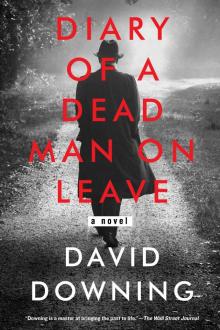 Diary of a Dead Man on Leave
Diary of a Dead Man on Leave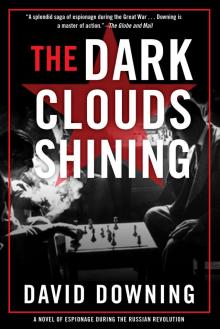 The Dark Clouds Shining
The Dark Clouds Shining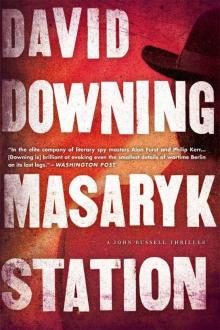 Masaryk Station (John Russell)
Masaryk Station (John Russell)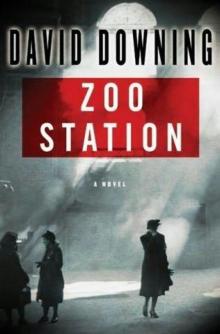 Zoo Stationee
Zoo Stationee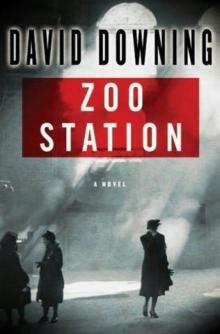 Zoo Station jr-1
Zoo Station jr-1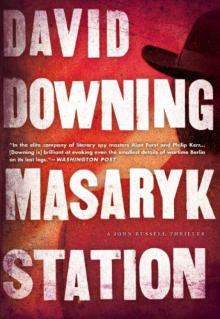 Masaryk Station
Masaryk Station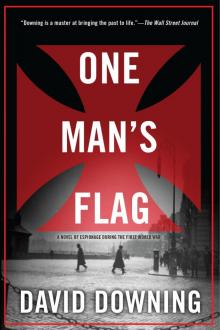 One Man's Flag
One Man's Flag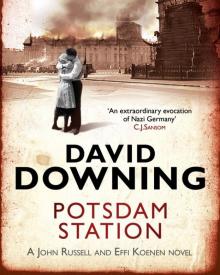 Potsdam Station jr-4
Potsdam Station jr-4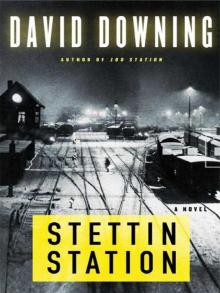 Stattin Station jr-3
Stattin Station jr-3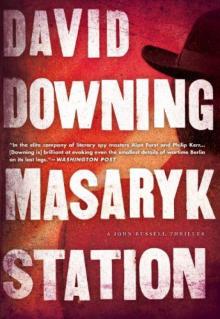 Masaryk Station jr-6
Masaryk Station jr-6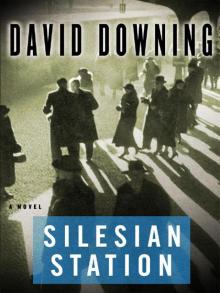 Silesian Station (2008) jr-2
Silesian Station (2008) jr-2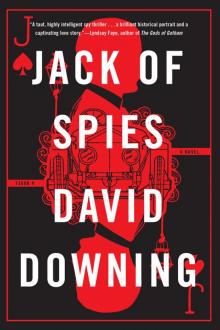 Jack of Spies
Jack of Spies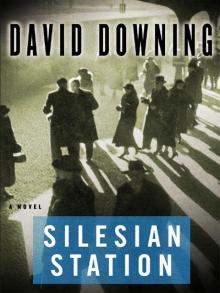 Silesian Station (2008)
Silesian Station (2008) The Moscow Option
The Moscow Option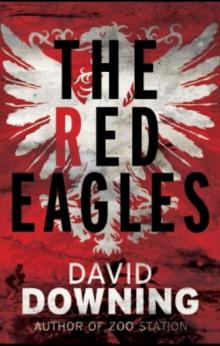 The Red Eagles
The Red Eagles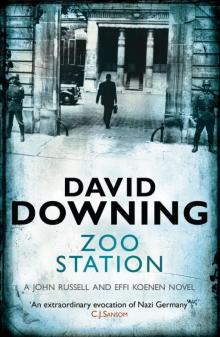 Zoo Station
Zoo Station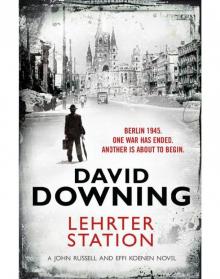 Lehrter Station
Lehrter Station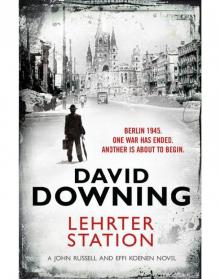 Lehrter Station jr-5
Lehrter Station jr-5